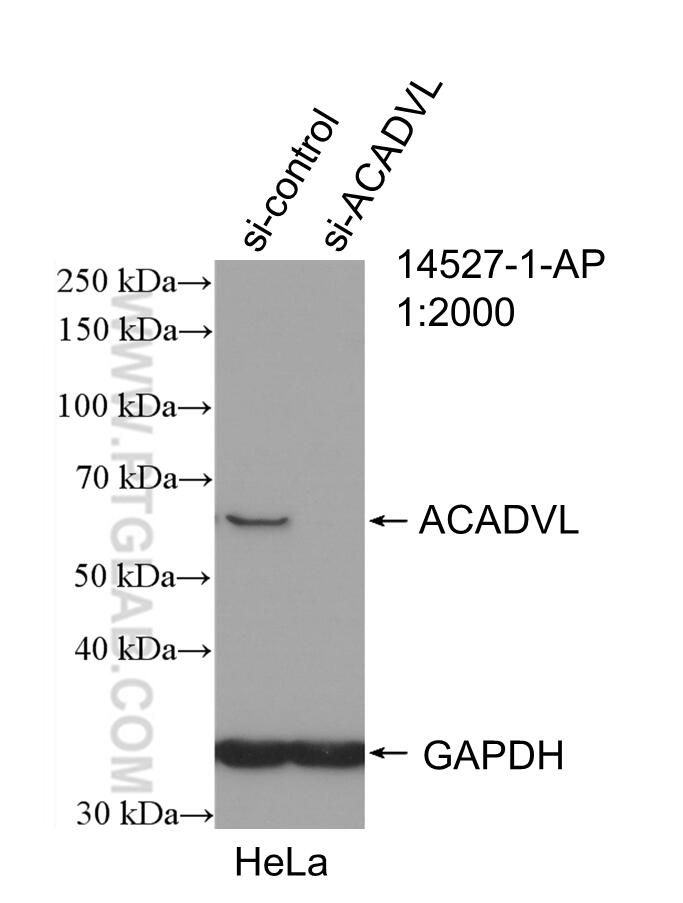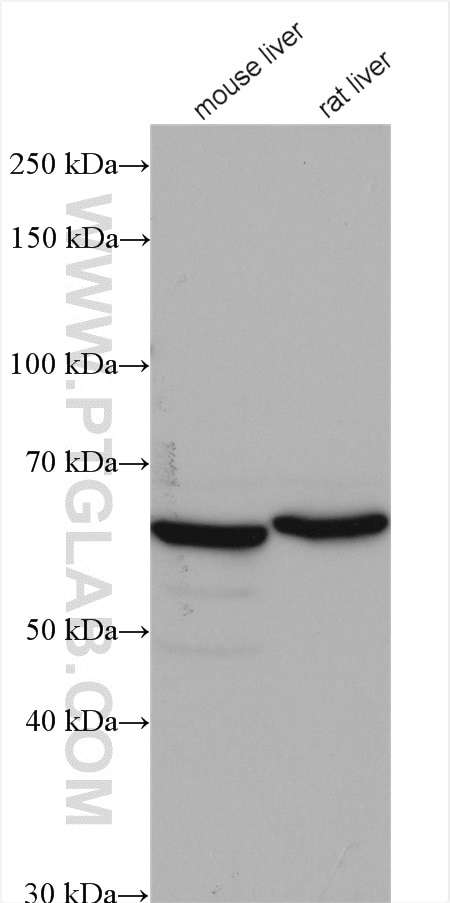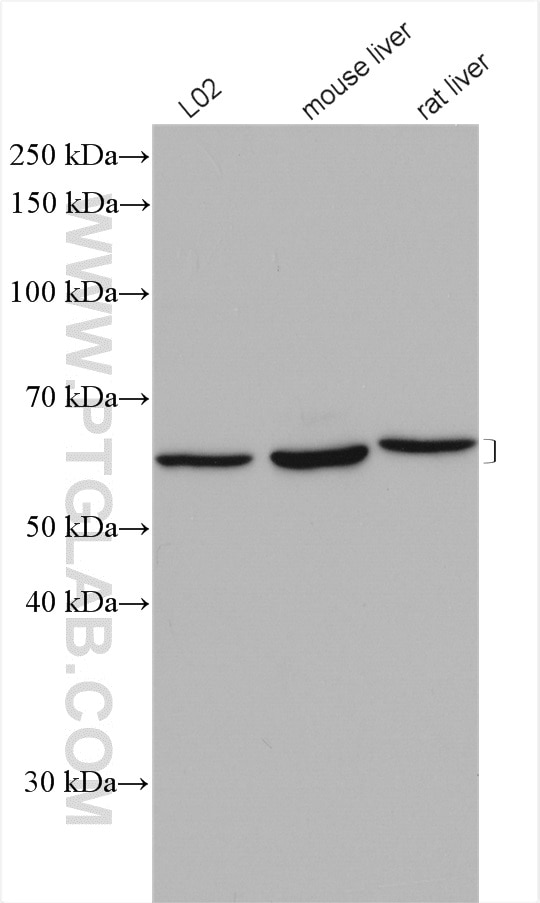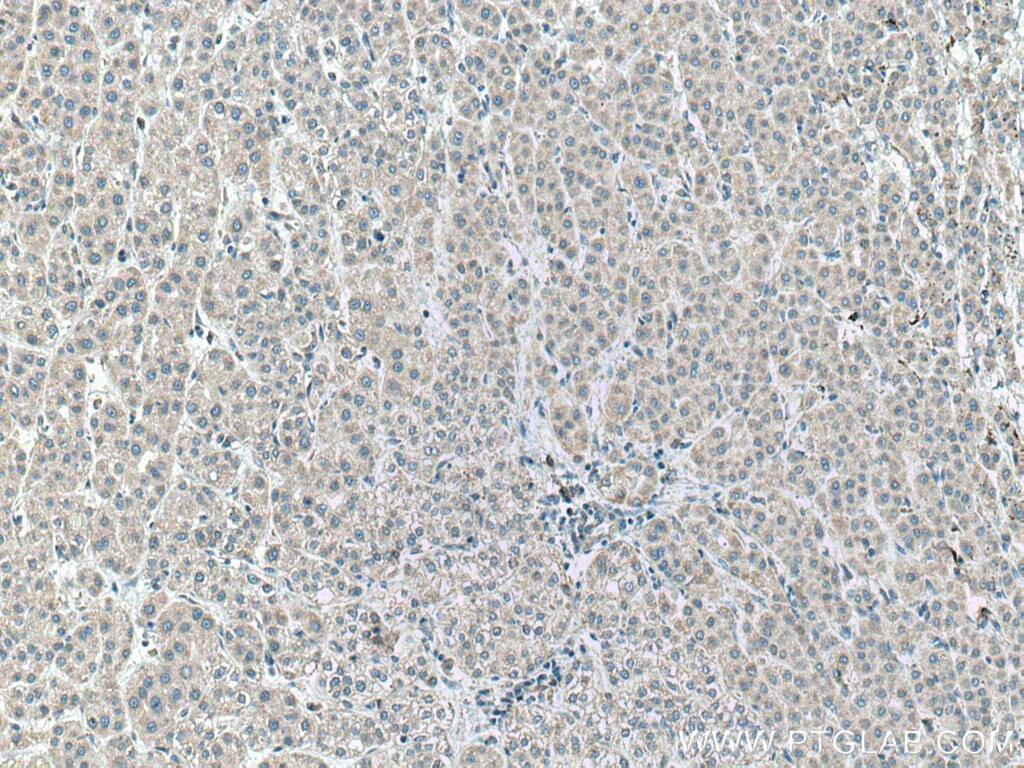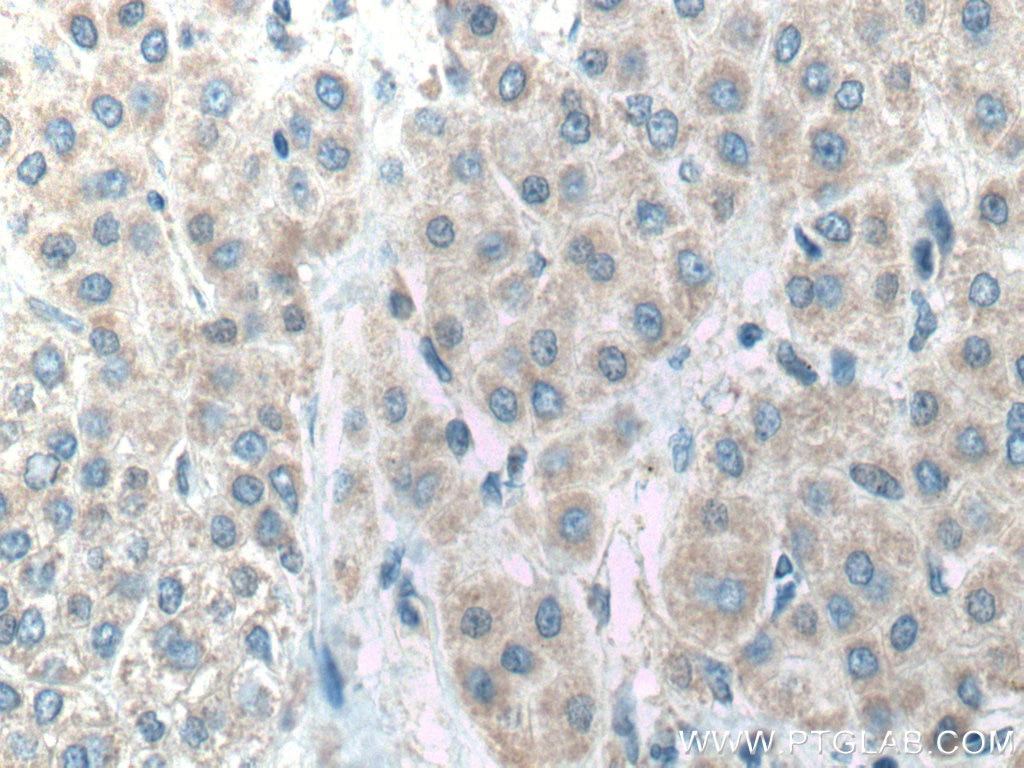- Phare
- Validé par KD/KO
Anticorps Polyclonal de lapin anti-ACADVL
ACADVL Polyclonal Antibody for WB, IHC, ELISA
Hôte / Isotype
Lapin / IgG
Réactivité testée
Humain, rat, souris
Applications
WB, IHC, ELISA
Conjugaison
Non conjugué
N° de cat : 14527-1-AP
Synonymes
Galerie de données de validation
Applications testées
| Résultats positifs en WB | tissu hépatique de souris, cellules HeLa, cellules L02, tissu hépatique de rat |
| Résultats positifs en IHC | tissu de cancer du foie humain il est suggéré de démasquer l'antigène avec un tampon de TE buffer pH 9.0; (*) À défaut, 'le démasquage de l'antigène peut être 'effectué avec un tampon citrate pH 6,0. |
Dilution recommandée
| Application | Dilution |
|---|---|
| Western Blot (WB) | WB : 1:1000-1:4000 |
| Immunohistochimie (IHC) | IHC : 1:100-1:400 |
| It is recommended that this reagent should be titrated in each testing system to obtain optimal results. | |
| Sample-dependent, check data in validation data gallery | |
Applications publiées
| WB | See 10 publications below |
| IHC | See 1 publications below |
Informations sur le produit
14527-1-AP cible ACADVL dans les applications de WB, IHC, ELISA et montre une réactivité avec des échantillons Humain, rat, souris
| Réactivité | Humain, rat, souris |
| Réactivité citée | rat, Humain, souris |
| Hôte / Isotype | Lapin / IgG |
| Clonalité | Polyclonal |
| Type | Anticorps |
| Immunogène | ACADVL Protéine recombinante Ag6016 |
| Nom complet | acyl-Coenzyme A dehydrogenase, very long chain |
| Masse moléculaire calculée | 70 kDa |
| Poids moléculaire observé | 66-73 kDa |
| Numéro d’acquisition GenBank | BC012912 |
| Symbole du gène | ACADVL |
| Identification du gène (NCBI) | 37 |
| Conjugaison | Non conjugué |
| Forme | Liquide |
| Méthode de purification | Purification par affinité contre l'antigène |
| Tampon de stockage | PBS avec azoture de sodium à 0,02 % et glycérol à 50 % pH 7,3 |
| Conditions de stockage | Stocker à -20°C. Stable pendant un an après l'expédition. L'aliquotage n'est pas nécessaire pour le stockage à -20oC Les 20ul contiennent 0,1% de BSA. |
Informations générales
Very long-chain acyl-CoA dehydrogenase (VLCAD) is one of four flavoproteins which catalyze the initial step of the mitochondrial b-oxidation spiral. It belongs to the acyl-CoA dehydrogenase family and is a homodimer of a 71-kDa polypeptide which contains 2 mol of FAD/mol of enzyme. The molecular mass of the nondenatured trypsinized VLCAD is 98 kDa, by gel filtration chromatography, indicating that it is a homodimer of the 48 kDa(tryptic digest) polypeptide(PMID:9461620). Defects in ACADVL are the cause of acyl-CoA dehydrogenase very long chain deficiency (ACADVLD). It has 2 isoforms(70 kDa and 68 kDa ) produced by alternative splicing and a transit peptide. This antibody is speicifc to ACADVL.
Protocole
| Product Specific Protocols | |
|---|---|
| WB protocol for ACADVL antibody 14527-1-AP | Download protocol |
| IHC protocol for ACADVL antibody 14527-1-AP | Download protocol |
| Standard Protocols | |
|---|---|
| Click here to view our Standard Protocols |
Publications
| Species | Application | Title |
|---|---|---|
Oxid Med Cell Longev Mild Hypothermia Attenuates Hepatic Ischemia-Reperfusion Injury through Regulating the JAK2/STAT3-CPT1a-Dependent Fatty Acid β-Oxidation. | ||
Cell Rep HIF-1-Mediated Suppression of Acyl-CoA Dehydrogenases and Fatty Acid Oxidation Is Critical for Cancer Progression. | ||
Front Immunol Impaired Autophagy and Defective T Cell Homeostasis in Mice with T Cell-Specific Deletion of Receptor for Activated C Kinase 1. | ||
Biochim Biophys Acta Succinate accumulation impairs cardiac pyruvate dehydrogenase activity through GRP91-dependent and independent signaling pathways: therapeutic effects of ginsenoside Rb1. | ||
Biochim Biophys Acta Pharmacological inhibition of NOX4 ameliorates alcohol-induced liver injury in mice through improving oxidative stress and mitochondrial function. |
Avis
The reviews below have been submitted by verified Proteintech customers who received an incentive forproviding their feedback.
FH Tom (Verified Customer) (09-28-2020) | HEK293T lysate (10ug) ran on 4-20% gradient gel. Blocking in 5% BSA for 1 hour, followed by ACADVL antibody (1:1000 in block) overnight at 4 degrees. Goat anti-rabbit HRP (1:10,000) for 1 hour in block.
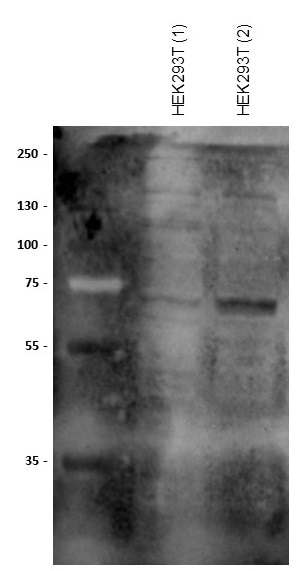 |
